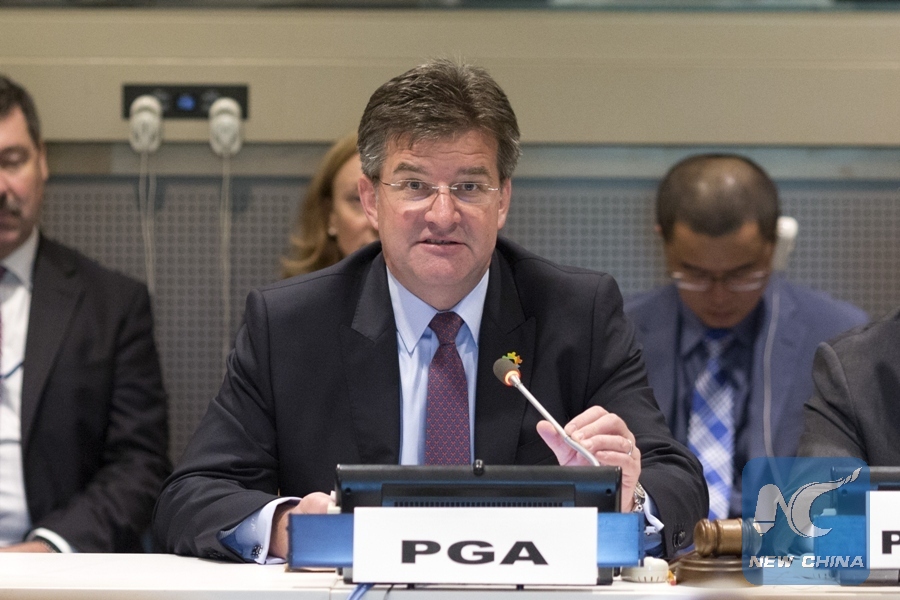
UN General Assembly President Miroslav Lajcak addresses a high-level symposium on the Chinese Belt and Road Initiative and the UN 2030 Agenda for Sustainable Development at the UN headquarters in New York, the United States, June 13, 2018. (Xinhua/Li Muzi)
by Xinhua writer Wang Jiangang
UNITED NATIONS, July 23 (Xinhua) -- United Nations General Assembly (UNGA) President Miroslav Lajcak has said that China's continuous support and investment in the United Nations are "fundamental to the functioning and credibility of this organization," particularly at a time when multilateralism is constantly challenged.
Lajcak said in a recent interview with Xinhua that China has been actively supporting UN peacekeeping operations. "China contributes more troops to those operations than all other permanent members of the Security Council combined. It is also the second-largest financial contributor to the peacekeeping budget."
"China is also playing a leading role in combating climate change and translating the 2030 Agenda into deeds, particularly through its National Plan for the Implementation of the 2030 Agenda and by aligning the 2030 Agenda with its national development strategy," he said.
Speaking of China's financial support to the United Nations, the president said that under the current scale of assessments, China contributes 7.921 percent to the UN regular budget (roughly 210 million U.S. dollars yearly) and 10.25 percent of UN peacekeeping budgets (amounting to over 810 million dollars yearly given the current level of peacekeeping activities).
"This makes China the second-largest financial contributor to United Nations' peacekeeping operations (second only to the United States) and the third biggest contributor to the United Nations' regular budget after the United States and Japan," he said.
"So it goes without saying that China has a critical role to play, ranging from peace to development, and those are the areas where the United Nations and China should continue to enhance their cooperation," said the president.
Lajcak also spoke highly of some of China's initiatives and development concepts by saying that "China's initiatives such as Belt and Road and (building a community with a) Shared Future for Humanity are in line with the spirit and value of multilateralism."
"The United Nations can serve as a good platform for China to seek broader cooperation with member states," the president added.
Whenever the Security Council is divided over some thorny problems and fails to adopt resolutions or make decisions, some UN member or observer states tend to resort to the General Assembly for help or moral support. Regarding this, the president said that the UN Charter confers on the Security Council primary responsibility for the maintenance of international peace and security.
"At the same time, the General Assembly can hold emergency special sessions and make recommendations aimed at restoring international peace and security if the Security Council is unable to act," he said.
"During my presidency, I have resumed the 10th emergency special session twice, at the request of Member States. As President, it is important that I respect the wishes of Member States and ensure that the General Assembly is functioning properly," he said. "That is my primary concern."
The 10th emergency special session of the General Assembly centers on the Israeli-Palestinian conflict: the ongoing dispute and conflict over the West Bank and the Gaza Strip. The session was first convened in 1997 under then UNGA President Razali Ismail. This occurred when the Security Council failed to make a decision on the issue at two different meetings.
The session was last resumed on June 13, 2018 to consider a draft resolution entitled "Protection of the Palestinian civilian population," at the request of member states.
Concerning how to protect multilateralism, the president said that "we are living in a constantly evolving world, and we face various challenges and uncertainties that transcend national boundaries, such as conflicts, terrorism, climate change, natural disasters, diseases and inequality."
"None of us is able to deal with these issues alone," the president said.
"It is in our best interest to continue to strengthen the United Nations' system and multilateralism," Lajcak said, adding that "multilateral solutions are a must -- not an option."
All member states should believe in and support the work of the United Nations, because it is "the most representative and legitimate intergovernmental organization in the world," he said.
"And it has the capacity to unite the world in coping with the challenges that might impact our humanity," the president said.
Lajcak admitted that it is natural that sometimes "it is hard to reach consensus" because member states may have different positions. "But at least the United Nations provides a platform and mechanism for Member States to discuss and reach consensus."
"Meanwhile, we also need to bring the United Nations closer to people and make it more relevant to their needs. We also need to improve its efficiency and effectiveness. That is why we are reforming the United Nations," he added.
When asked how he would comment on the U.S. withdrawal from a number of UN agencies or programs, the president said, "I believe that our collective work to ensure a better world will benefit from more dialogue and collaboration -- not less. In that regard, I would encourage all Member States to remain closely engaged with all United Nations' agencies, programs and processes."
Lajcak happily recalled his recent visit to China. What impressed him most was "China's renewed commitment to multilateralism."
"This visit further enhanced mutual understanding and cooperation between the United Nations and China on many critical matters, in particular how both could work together on sustaining peace and to achieve sustainable development across the world," he said. "The visit was a success."

